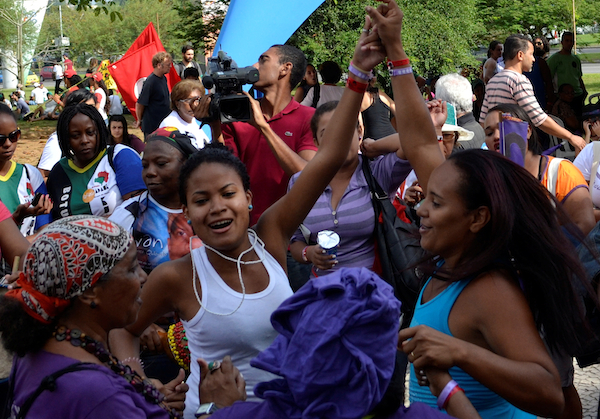Working toward gender equality and environmental justice
It began simply. A group of women friends worried about the world, a group of women activists determined to be the change they wanted to see.
Led by U.S. Congresswoman Bella Abzug (1920-1998) and activist/journalist Mim Kelber (1922-2004), the group decided to use the 1992 Earth Summit (UN Conference on Environment and Development) as a springboard toward achieving their long-term goals of gender equality and environmental justice in a sustainable world.
The result was WEDO, the Women’s Environmental and Development Organization, now in its 24th year. International in character – core founding members included Nobel Laureate Wangari Maathai of Kenya, Thais Corral of Brazil and Vandana Shiva of India – WEDO set out to open the doors to women’s participation in the enormous environmental issues facing the planet.
From the beginning, WEDO’s strength has been in collaboration. Rather than acting alone at the Earth Summit, WEDO founders brought together some 1,500 women from over 80 countries to help shape their strategy. The resulting Women’s Action Agenda 21 presented an outline for change that included women’s rights, advocating its position so powerfully that gender equality was included as a central plank in the final Earth Summit declarations and documents.
Since that initial success, WEDO has continued to advocate internationally for linkage between women’s rights and the three central goals of leadership, sustainable development and good global governance. Its efforts have been so successful that, in 2006, it was named a “Champion of the Earth” by the United Nations Environment Programme. The UNEP recognized WEDO’s unceasing work for women’s economic, social and gender rights, calling the organization “a beacon for the empowerment of women across the environmental and development debate.”
In more recent news, WEDO participated in the March for Gender Equality and Women’s Rights last month in New York. The march was organized by the United Nations Women and the City of New York, among others, and WEDO provided support and information about the need for women’s voices to be heard in environmental issues. WEDO also facilitated the submissions of women’s groups at the 2015 World Conference on Disaster Risk Reduction (WCDRR) in Sendai, Japan last month.
If you want to learn more about WEDO’s activities or to get involved, opportunities are varied and plentiful. Their website contains extensive information about WEDO’s goals, as well as past, current and future projects. One place to start is with its newest report, entitled “Ensuring Women’s Access and Influence on Climate Change Policy” that describes the Women Delegates Fund (WDF), which works to enhance women’s participation and leadership in climate negotiations.
Other ways to get involved with WEDO:
• Follow WEDO on Facebook
• Keep up with WEDO on Twitter
• Read up on WEDO’s history and accomplishments in Celebrating Momentum and Milestones: A WEDO History of Women’s Organizing Toward a Healthy and Peaceful Planet
• Become a Friend of WEDO with a donation
• Find a volunteer opportunity that works for you
• Apply for an internship
 Living in France and Northern California, Teo Spengler is an attorney, novelist and writer, deeply committed to the environmental movement. Spengler holds a Master of Arts in creative writing from San Francisco State University and a Juris Doctor from UC Berkeley. She is currently a candidate for a Master of Fine Arts in fiction. She writes for Demand Media and EHow in the areas of legal advise, travel, exploring nature, and gardening.
Living in France and Northern California, Teo Spengler is an attorney, novelist and writer, deeply committed to the environmental movement. Spengler holds a Master of Arts in creative writing from San Francisco State University and a Juris Doctor from UC Berkeley. She is currently a candidate for a Master of Fine Arts in fiction. She writes for Demand Media and EHow in the areas of legal advise, travel, exploring nature, and gardening.
